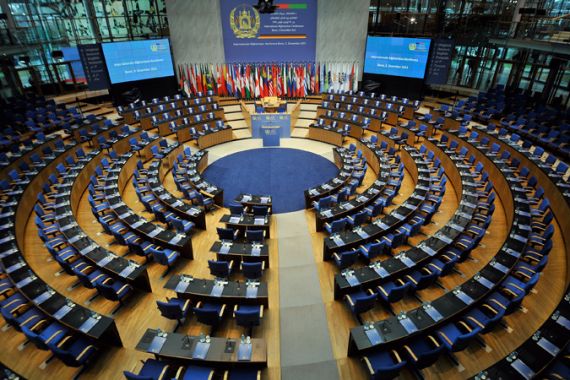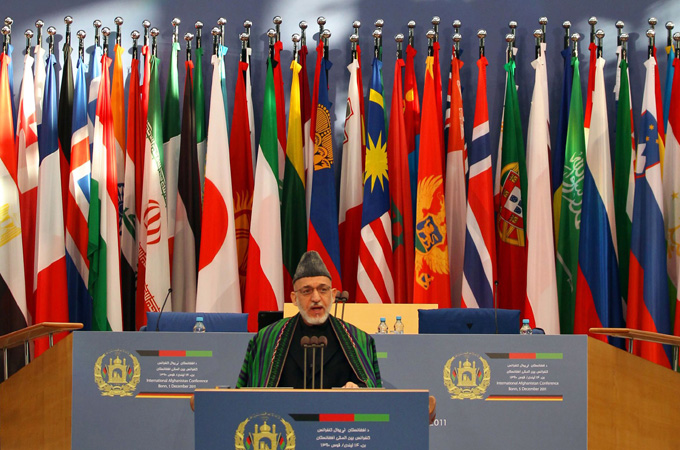A dearth of substance plagues Bonn conference
The Bonn conference was full of empty rhetoric and underscored the hurdles threatening the future of Afghanistan.

 |
| President Karzai’s ability to undertake promised reforms is questionable given his administration’s track record [EPA] |
Islamabad, Pakistan – What didn’t happen at the recent Bonn conference on the future of Afghanistan is more significant than what did.
The sponsors wanted the summit of 85 countries to be a signal that the US-led coalition wasn’t abandoning Afghanistan and would remain in the country ‘for the long haul’. As a pre-cooked expression of continued international engagement, the conference affirmed support for Afghanistan beyond 2014, when the US and NATO combat troops are slated to pull out of the country and hand over the security to the Afghan forces.
But there were few – if any – specifics, and aid commitments made at Bonn will only translate into financial details at a donor conference scheduled in Tokyo next July.
The rhetoric embellishing the document adopted at Bonn did little to disguise unanswered questions about the 2014 transition. Nor did the conference, aimed at solidifying regional co-operation, manage to eclipse concerns about the challenge of navigating a palpably more fraught regional environment. This was in turn marked by the dramatic deterioration in the Pakistan-US relations following the November 26 killing of Pakistani soldiers by NATO forces, which led to Islamabad’s boycott of Bonn. Washington’s hostile relations with Iran and strained ties with Pakistan are not the way in which to achieve a ‘successful’ transition.
And that was far from the only example of the gap between aspiration and reality at the Bonn conference.
|
“If a successful transition in 2014 rests on reconciliation talks for a peace deal, then Bonn did not contribute to that goal.“ |
When Bonn II was announced last year – a decade after the first Bonn conference – the original intention was to announce progress on Afghan-Taliban reconciliation, which could provide a way to wind down the war. The conference had initially been seen as a way to highlight this reconciliation process. But with a lack of headway on serious negotiations, this plan was abandoned – as was inviting a Taliban delegation as a “peace partner” to the conference. An announcement to open a Taliban office in Qatar – aimed at sustained talks – was also deferred, apparently due to a last minute change of heart by Afghan President Hamid Karzai.
‘Joint facilities’
With progress on reconciliation clouded by uncertainty and the size of the Afghan security forces yet to be determined, the Bonn conference focused instead on affirming principles in support of Afghanistan’s future. But even on that count, it wasn’t clear what kind of future state and configuration was being endorsed by participating nations and organisations.
Significantly, the long-term partnership agreement being negotiated between Washington and Kabul has yet to be unveiled. The plan was to do so by Bonn, until it ran into problems. Its conclusion has been delayed by the lack of agreement on two key objections raised by the Karzai government: the end of night all raids and the release of Afghan prisoners held by American troops. Fresh drafts of the partnership agreement are due to be exchanged in the following weeks.
The agreement is expected to provide open-ended US access to bases in Afghanistan. Regardless of whether they are called “joint facilities”, this move is opposed by almost all of Afghanistan’s neighbours and near neighbours, and would ultimately hinder the ideal of reaching a regional consensus. It may also be a deal-breaker in talks with the Taliban.
The Bonn conference sidestepped these issues to focus on the so-called bargain between Afghanistan and the international community’s support and commitment to lasting engagement. In exchange for these international pledges, Kabul committed to undertake reforms, crackdown on corruption, and ensure free and fair elections in 2014, the year President Karzai is due to step down. As Secretary Clinton emphasised, the US wants foreign assistance to be reciprocated by better governance and reforms.
But uncertainty is rife on both sides of the bargain. On the one hand, the Karzai administration does not have an inspiring record when it comes to putting its house in order. And as for long-term financial assistance, the international community’s appetite will be tried at Tokyo and beyond. But it is already clear that aid decisions will be dictated by the fiscal constraints imposed by the Eurozone crisis and America’s economic troubles and was reflected in the rejection of Kabul’s demand for a “transition dividend”. All this indicates the shape of things to come.
What Bonn highlighted yet again was the fact that the timelines set by Washington and its NATO allies were determined by political considerations rather than the situation on the ground. This, in addition to unresolved tensions in the US policy, puts into question Washington’s ability to influence regional dynamics. And the complex challenge of brokering reconciliation does not suggest an easy path to an orderly Afghan. With three years left for the 2014 transition, there is much ground to cover in the face of many unknowns.
Maleeha Lodhi is a special adviser to the Jang Group/Geo and a former envoy to the US and the UK.
The views expressed in this article are the author’s own and do not necessarily reflect Al Jazeera’s editorial policy.
